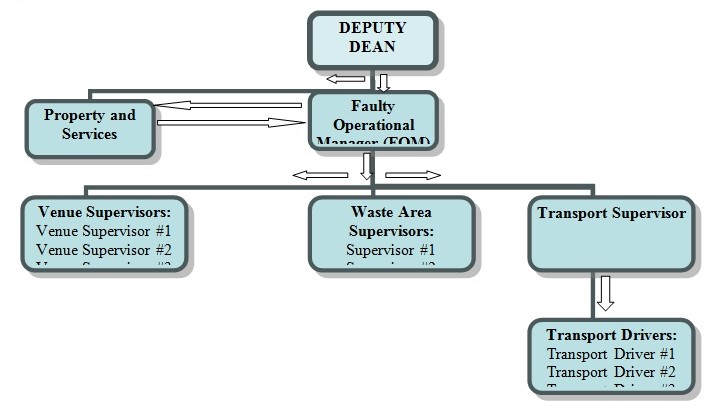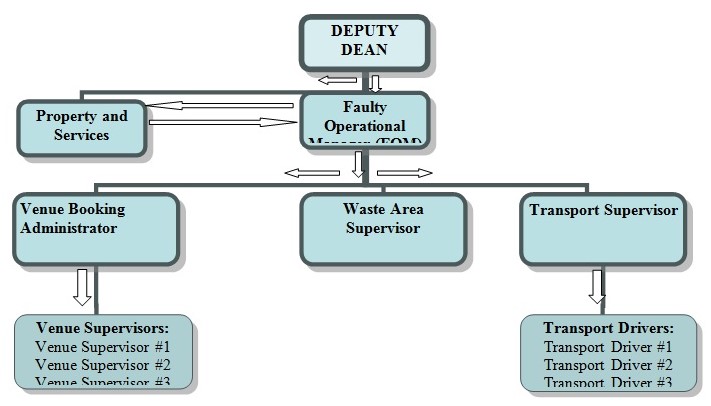Introduction
The three major functions of the Health Science Faculty, waste, transportation, and venue management, are an integral part of university operations. Venue preparation, transport to off-site clinics, and hazardous waste management systems ensure that the learning process of a student is efficient and safe. Failure of any one of the systems has a major impact on the faculty’s ability to deliver its mandate and vision.
This paper will focus on the two management systems within the operations department: waste and venue management. Firstly, the two systems will be discussed in detail and shortcomings will be identified. Secondly, a new system will be proposed that is more efficient in terms of the primary functions of the two systems. Thirdly, the impact of the changes on employee working conditions and development, quality of services delivered, cost-effectiveness, safety concerns, and overall organizational performance will be assessed. Finally, possible shortcomings of the proposed management system will be identified in the concluding part.
Current Venue and Waste Management Operation Systems
The organizational structure of the operational department is outlined in Organizational Chart #1. Currently, the university has fifty-three venues that are managed by only three supervisors. The three supervisors are responsible for locking and unlocking the venue, audiovisual set-ups, maintenance as well as safety aspect within the venues. Aside from this, one of the supervisors is also responsible for the booking of the venues, which is an extra duty alongside regular supervisor duties outlined above.
The current system has three major disadvantages. Firstly, it is humanly impossible for the three supervisors to be present in each one of the venues before every lecture, which makes it impossible to guarantee that venues are maintained at the required level. Secondly, the maintenance duties of a supervisor who is also responsible for the booking of the venues are conflicting. This not only prevents the supervisor from fulfilling maintenance duties but also results in a lack of communication between two other employees and leads to distraction in the information flow. Finally, the present organizational system is not adjusted for emergencies. If one of the supervisors has to take a leave, there is no substitute employee to cover the leave.
As evident from Organizational Chart #1, currently, three supervisors are managing the Hazardous Waste area. It should be noted, that employees are working without a Job Description and any formal training for handling hazardous waste. Since any person working with hazardous material must be formally trained under the regulations issued by the United States Environmental Protection Agency (USEPA), such organizational structure is not only dangerous for students and staff members but is also illegal. Going even further, significant cost reductions could be realized by leaving one adequately trained professional supervisor instead of three currently employed.
Organizational Chart #1

Proposed Venue Operation System
When proposing a new venue operation system, the following factors have been considered: quality of services delivered, employee development, and overall organizational impact. Having assessed present organizational needs, I propose to hire one more venue supervisor and venue booking administrator. The proposed organizational structure is outlined in Organizational Chart #2.
Service delivery
For the faculty to meet this need we would require 4 venue supervisors which would service the 12 large venues. These venue supervisors will be strategically placed within each building that houses the large lecture theatres. The advantage is that they will be at hand in the event of a problem. The time spent to resolve a problem will be substantially less, which will in turn lessen the stresses on the lecturer. There will also be sufficient time to concentrate on maintenance and safety within the various buildings supervised.
Employee development
The proposed organizational system has several benefits that improve both the working environment of employees and the quality of work performed. Firstly, since informational flow is not distracted given a venue booking administrator is hired, the work pressure on supervisors will be lowered and the quality of work will improve, as the working process will be organized better.
Impact on the organization as a whole
The proposed organizational structure will have a positive impact on staff members in both IIDMM and the Anatomy building. In the IIDMM, the Senior Technical Officer fulfills the position of a venue supervisor; whereas in the Anatomy Building, the Chief Technical Officer fulfills certain maintenance functions within the building. Both these staff members are above pay class 9 and are doing the functions of a pay class 6. Consequently, cost savings will be realized with the new supervisors hired for both the IIDMM building and for the Learning Centre/Anatomy building.
Organizational Chart #2

Proposed Waste Area Management System
As previously stated, the current waste area management system employs three waste area supervisors that are not properly trained. I propose to have one waste area supervisor, the incumbent, who will take responsibility for the whole area and will be trained to perform strictly by safety guidelines.
Safety issues
Waste management, especially when it comes to hazardous waste, must correspond to effective regulations. To determine and effectively handle hazardous waste, I propose a job description for the incumbent as well as effective safety guidelines that correspond to regulations issued by the United States Environmental Protection Agency (USEPA). This solution will maximize student and staff safety since waste management will be carried out by one skilled employee.
Cost reductions
Since only one employee will be hired instead of three, significant cost reductions will be realized in the long run. Even though a minor additional investment will be needed in the nearest future to provide training, costs will be offset by long-run benefits.
Conclusion
Although the proposed solution has long-term benefits for overall organizational performance such as cost reductions, improvement in information flow, increased employee productivity, a greater level of safety, improvement in the quality of services provided, there might be short-term adverse effects. To be more precise, restructuring of waste management will require professional training, which, in turn, increases short-term costs. However, the adverse effects will be offset in the long run, when employees get used to the new organizational structure.